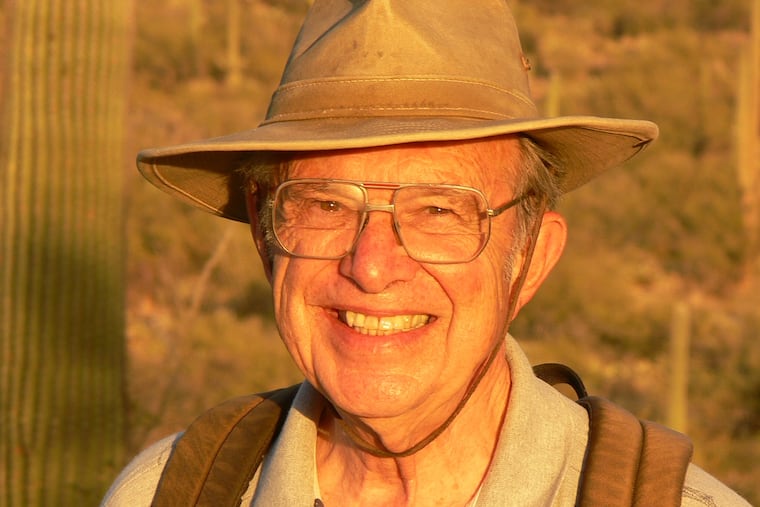Elias S. Cohen, Pa.’s first commissioner on aging who later advocated for the old and disabled, dies at 93
Mr. Cohen passionately supported the elderly, and didn't mince words when testifying before government committees. At one point he was called a 'wild jackass.' He was delighted with the insult.

Elias Surut Cohen, 93, of Wynnewood, Pennsylvania’s first commissioner on aging who later became a lawyer and director of the project on aging for the Public Interest Law Center of Philadelphia, died Tuesday, Nov. 24, of an intestinal ailment at Lankenau Medical Center.
In 1956, Mr. Cohen, then 29, was appointed the state commissioner for aging issues in the Department of Public Welfare. He held the position for 12 years and gave it a high profile.
From 1968 to 1970, he served as the state’s commissioner of family services, administering public assistance programs.
Mr. Cohen was a passionate advocate for the elderly, and lashed out when he felt they were at risk.
On April 25, 1979, after nine elderly residents of an unlicensed boarding home in Connellsville, Pa., died in a fire, Mr. Cohen excoriated state bureaucrats in testimony before the U.S. House Select Committee on Aging.
“The fire in which nine people perished would not have occurred had the Commonwealth of Pennsylvania carried out the law which has been on the books since 1966, requiring the licensing of such facilities,” he testified.
He blamed the state Department of Public Welfare, whose responsibility he believed it to be, for failing to create standards for such homes or assigning staff to implement them.
“If ever there was a case of bureaucratic nullification of legislative enactment, this is it,” he testified. “It is flagrant. It is deliberate. And it is obscene in its callous neglect of a problem of which the bureaucracy is well aware.”
Mr. Cohen came to the law relatively late in life, earning his degree in 1975 at 49 from the Temple University Beasley School of Law.
After serving on the faculty of the University of Pennsylvania School of Medicine, he became the attorney directing the Project on Aging, Law, and Long-Term Care at the Public Interest Law Center of Philadelphia.
His advocacy for the elderly expanded to include the mentally disabled and impoverished. “He rarely took a case from anyone who could afford to pay his fee,” his family said in a statement. “He would drive to the homes of clients who had lost their car to bankruptcy or poverty to give them rides” to court.
One of his specialties was cases in which zoning was used as a weapon against group homes. He fought and won a landmark 1979 case (Hopkins v. Zoning Hearing Board) that established the right of group homes for the mentally disabled to exist in residential neighborhoods.
The case tested whether Geoffrey and Beth Hopkins could use their Abington Township house as a home for three mentally disabled children unrelated to them. The township zoning board said the use was unlawful based on the traditional definition of family, but on appeal, the Pennsylvania Commonwealth Court ruled that the definition was too narrow.
He pushed stringent safety and health standards for nursing home operators and sometimes made enemies with his forceful approach.
His fights took him to the Pennsylvania legislature, most notably in 1961 when lawmakers considered a bill to regulate personal care homes for adults. During the reading of House Bill 1172 on the Senate floor on July 24, Sen. Israel Stiefel, a Philadelphia Democrat, called Mr. Cohen “a wild jackass.”
“A public official should be firm, decent, and courteous,” Stiefel said, “and these are qualities which Elias Cohen lacks.”
Mr. Cohen’s family said he delighted at being called a jackass. Despite Sen. Stiefel’s attack on Mr. Cohen, at least one other senator defended him, and the legislation passed.
From 1976 to 1981, Mr. Cohen was the editor-in-chief of The Gerontologist, a national journal on aging.
Mr. Cohen was a collector of antique American sheet music, with emphasis on portrayals of the elderly. Yale University has his collection.
In addition to teaching at Penn, he lectured for several years at Temple University and the University of Maryland.
Mr. Cohen met Marcia Rosen in high school on Long Island. They married in 1948 and raised two sons in Camp Hill. Later, they moved to Wynnewood.
In addition to his wife, he is survived by sons Barry J. and Peter L., and four grandchildren.
Services and interment are private.
This story has been updated.